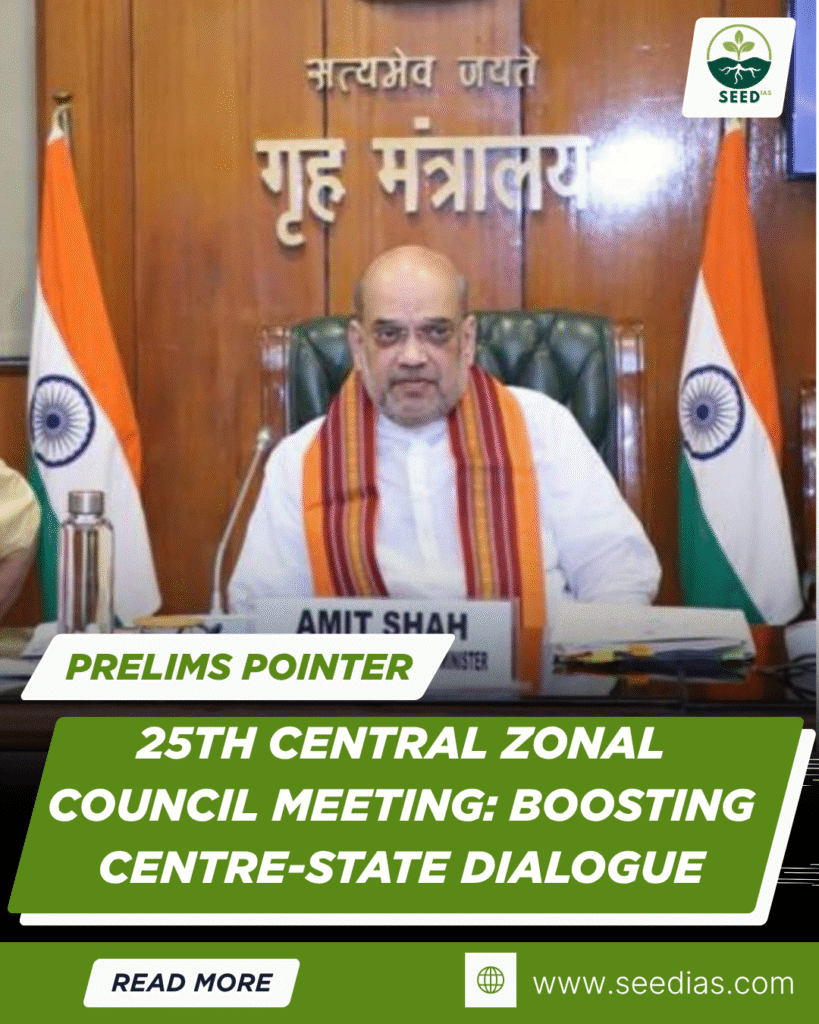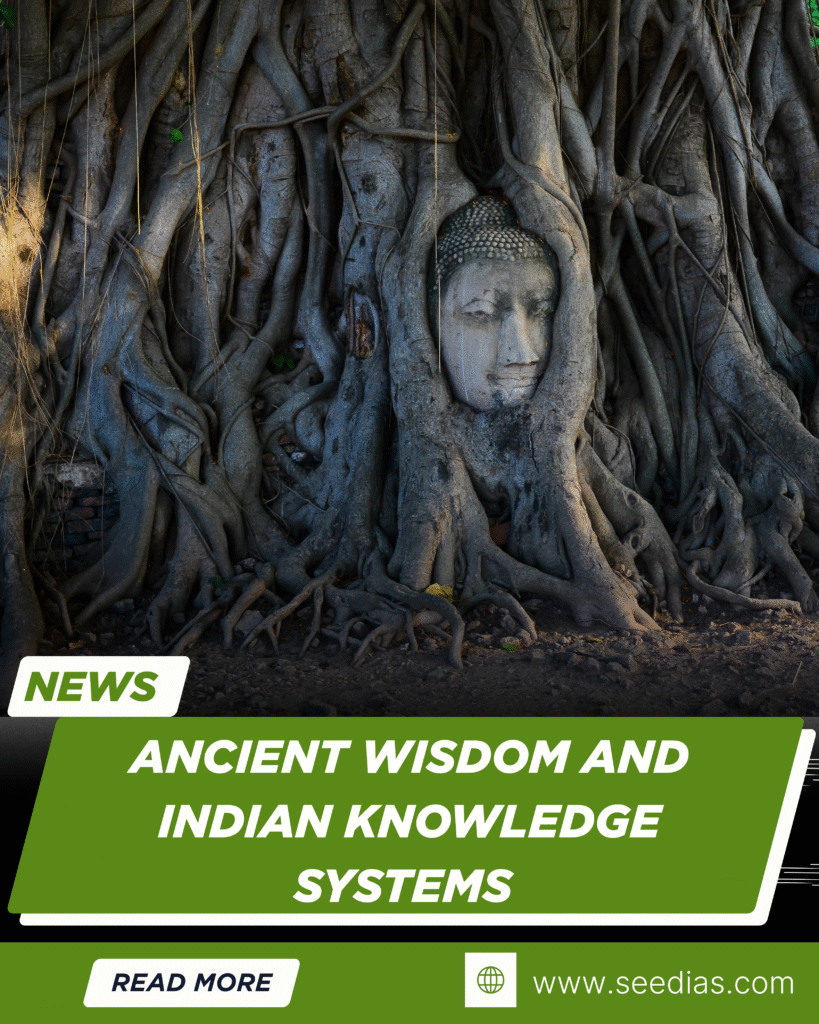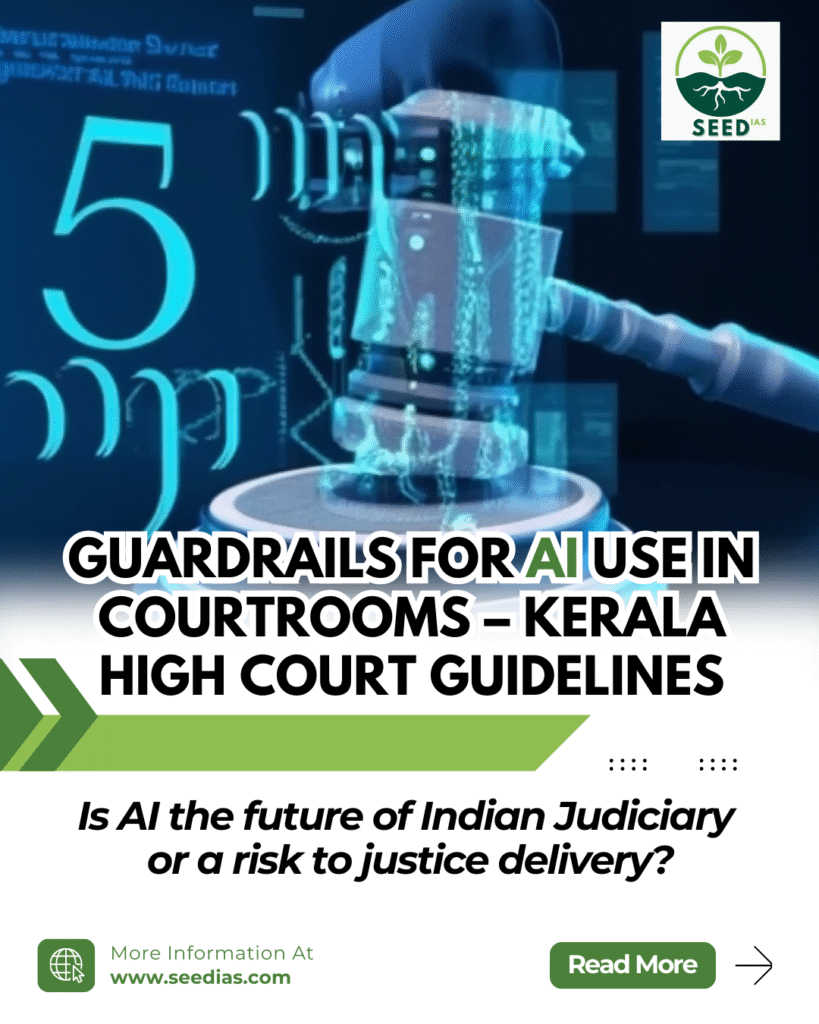Why in NEWS
The Union Home Minister and Minister of Cooperation chaired the 25th Central Zonal Council meeting in Varanasi, Uttar Pradesh. Organized by the Inter-State Council Secretariat and the UP Government, the meeting addressed key regional and inter-state cooperation issues.
Key Concepts & Definitions
| Term | Explanation |
|---|---|
| Zonal Councils | Statutory advisory bodies for regional cooperation, created in 1956 |
| States Reorganisation Act, 1956 | Law that reorganized Indian states and established five Zonal Councils |
| Cooperative Federalism | Coordination and collaboration between Centre and States |
| North Eastern Council (NEC) | Separate council for NE states, established under NEC Act, 1972 |
About Zonal Councils
| Feature | Details |
|---|---|
| Legal Basis | Established under Sections 15–22 of the States Reorganisation Act, 1956 |
| Nature | Statutory (not constitutional) |
| Objective | To foster cooperation among states and between Centre and States |
| First Proposed By | Jawaharlal Nehru (1956), post Fazal Ali Commission report |
| Number of Councils | 5 + 1 (NEC) |
| Meeting Frequency | Regular meetings; 61 meetings in last 11 years |
Zonal Council Composition
| Role | Designation |
|---|---|
| Chairman | Union Home Minister (also NEC chairman) |
| Vice-Chairman | Chief Minister of a member state (annual rotation) |
| Members | Chief Ministers, LGs/Administrators, two state-nominated ministers |
| Advisors | NITI Aayog nominee, Chief Secretaries, Development Commissioners |
| Permanent Committee | Chief Secretaries of member states; screens issues before full council meets |
Division of Zonal Councils
| Council | States/UTs Included |
|---|---|
| Northern | Haryana, Himachal Pradesh, J&K, Punjab, Rajasthan, Delhi, Chandigarh |
| Central | Uttar Pradesh, Madhya Pradesh, Chhattisgarh, Uttarakhand |
| Eastern | Bihar, Jharkhand, Odisha, West Bengal, Sikkim |
| Western | Rajasthan, Gujarat, Maharashtra, Goa, Dadra & Nagar Haveli, Daman & Diu |
| Southern | Andhra Pradesh, Karnataka, Kerala, Tamil Nadu, Puducherry |
| North Eastern Council | Assam, Manipur, Meghalaya, Mizoram, Tripura, Nagaland, Arunachal Pradesh, Sikkim |
Functions and Objectives
| Purpose | Key Areas of Discussion |
|---|---|
| Coordination Platform | Structured dialogue on inter-state and Centre–State issues |
| Law and Order | Speedy probe of sexual offences, Fast Track Special Courts (FTSCs) |
| Infrastructure | Brick-and-mortar banking in remote areas, power sharing |
| Social Development | Education, nutrition, urban planning, and public health |
| Technology & Emergency | Emergency Response System (ERSS-112) implementation |
| Cooperative Sector | Regional development via strengthened cooperative institutions |
In a nutshell
Memory Code: “ZONAL: Zones Of Nation Aligning Legally”
- Zones created for coordination
- Overseen by Union Home Minister
- Not constitutional, but statutory
- Aims to promote Centre–State harmony
- Legally backed by Reorganisation Act
Prelims Practice Questions
- Which of the following Zonal Councils includes the state of Uttarakhand?
A. Northern Zonal Council
B. Central Zonal Council
C. Eastern Zonal Council
D. Western Zonal Council - Which of the following statements is correct about Zonal Councils?
A. They are constitutional bodies
B. They are established under the Planning Commission Act
C. They are chaired by the President of India
D. They are advisory bodies under the States Reorganisation Act, 1956 - Which Council is not covered under the Zonal Councils created by the 1956 Act?
A. Southern Zonal Council
B. North Eastern Council
C. Central Zonal Council
D. Eastern Zonal Council
Mains Practice Questions
- Discuss the role of Zonal Councils in strengthening cooperative federalism in India. (10 marks)
- “Though advisory in nature, Zonal Councils play a pivotal role in addressing regional challenges.” Evaluate with examples. (15 marks)
Prelims Answers Table
| Q No. | Answer | Explanation |
|---|---|---|
| 1 | B | Central Zonal Council includes UP, MP, Chhattisgarh, and Uttarakhand |
| 2 | D | Zonal Councils are statutory advisory bodies under the 1956 Act |
| 3 | B | NEC was created under a separate Act in 1972, not under the 1956 Act |
















